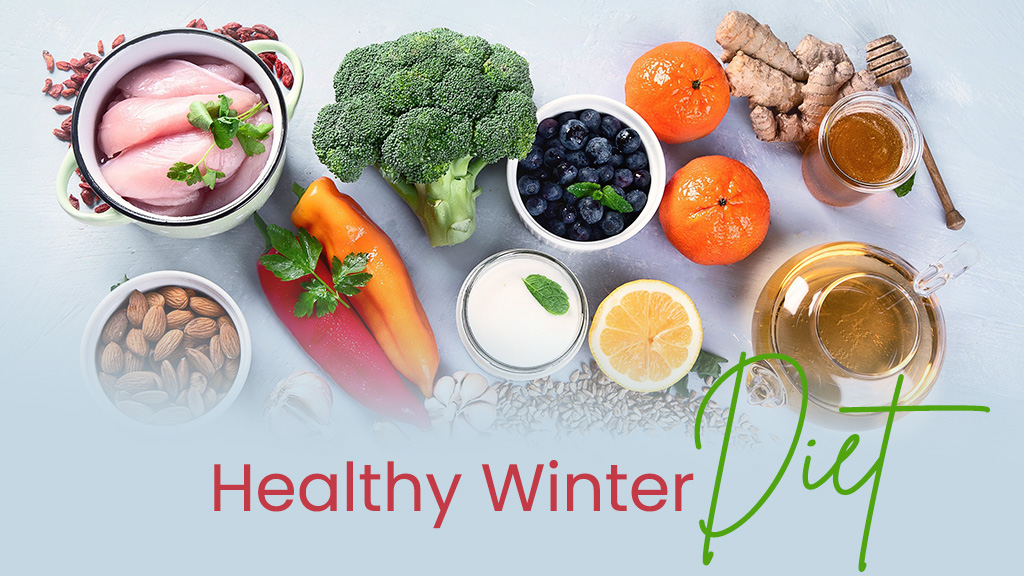Maintaining a healthy winter diet is essential for keeping your immune system strong and energy levels up during the colder months. Here are some tips:
Include Seasonal Vegetables
Winter vegetables like kale, Brussels sprouts, carrots, and sweet potatoes are not only delicious but also packed with essential nutrients.

Benefits: Seasonal vegetables are rich in vitamins, minerals, and antioxidants. They provide essential nutrients for overall health, support immune function, and contribute to maintaining a healthy weight.
Foods: Kale, Brussels sprouts, carrots, sweet potatoes, broccoli, cauliflower, winter squash.
Warm Soups and Stews

Opt for homemade soups and stews. They’re not only comforting but also a great way to incorporate a variety of vegetables, legumes, and lean proteins into your diet.
Benefits: Warm soups and stews are not only comforting but also hydrating. They offer a diverse range of nutrients from vegetables, lean proteins, and whole grains. The warm temperature can soothe the throat and provide a sense of satisfaction, making them a nourishing choice during the winter months.
Foods: Homemade vegetable soup, lentil soup, chicken stew, bean stew, minestrone soup.
Citrus Fruits
While some fruits may be less available in winter, citrus fruits like oranges, grapefruits, and clementines are in season. They’re rich in vitamin C, which is crucial for immune health.
Foods: Oranges, grapefruits, clementines, mandarins, lemons, limes.
Benefits: Citrus fruits are renowned for their high vitamin C content, a crucial nutrient for immune health. Additionally, they contain other antioxidants and flavonoids that support overall well-being. The refreshing taste adds a burst of flavor to your diet.
Healthy Fats
Include sources of healthy fats like avocados, nuts, and olive oil. These fats provide energy and help keep you feeling satisfied.

Foods: Avocado, nuts (almonds, walnuts), seeds (chia seeds, flaxseeds), olive oil, fatty fish (salmon, mackerel).
Benefits: Healthy fats, such as those found in avocados, nuts, and olive oil, provide sustained energy, support brain function, and aid in the absorption of fat-soluble vitamins. They also contribute to satiety, helping you feel full and satisfied.
Hydrate

Even though it’s cold, it’s important to stay hydrated. Drink plenty of water, herbal teas, and warm water with lemon to support your overall health.
Benefits: Staying hydrated is vital for maintaining bodily functions, supporting metabolism, and regulating body temperature. Proper hydration helps transport nutrients, flush out toxins, and keeps your skin and mucous membranes healthy, which is especially important in dry winter weather.
Foods: Water, herbal teas, warm water with lemon, broths, hydrating fruits (watermelon, cucumber).
Protein-rich Foods
Include lean proteins like poultry, fish, beans, and lentils in your meals. Protein is essential for muscle health and overall well-being.
Benefits: Protein is essential for building and repairing tissues, maintaining muscle mass, and supporting the immune system. Including lean proteins in your diet helps with muscle recovery, provides a sense of fullness, and aids in weight management.
Foods: Poultry (chicken, turkey), fish, lean cuts of beef or pork, beans, lentils, tofu, eggs.
Spices and Herbs
Incorporate winter spices like cinnamon, ginger, and garlic into your dishes. Apart from adding flavor, they also have various health benefits.
Benefits: Winter spices like cinnamon, ginger, and garlic not only enhance the flavor of your meals but also offer potential health benefits. For example, ginger has anti-inflammatory properties, while garlic may have immune-boosting effects, contributing to overall well-being.
Foods: Cinnamon, ginger, garlic, turmeric, cumin, rosemary, thyme, oregano.
Limit Sugary Treats
While it’s tempting to indulge in holiday sweets, try to limit your intake of sugary treats. Opt for healthier dessert options or enjoy sweets in moderation.
Benefits: Limiting sugary treats helps stabilize blood sugar levels, reduces the risk of weight gain and associated health issues, and supports dental health. Choosing healthier dessert options ensures that you enjoy a sweet treat without compromising your overall nutrition.
Foods: Choose healthier dessert options like fruit salads, yogurt with berries, or dark chocolate in moderation. Limiting intake of sugary snacks and beverages.
Vitamin D
Since sunlight exposure may be limited in winter, consider incorporating vitamin D-rich foods like fatty fish or fortified foods into your diet, or talk to your healthcare provider about supplements.
Benefits: Vitamin D is crucial for calcium absorption, bone health, and immune function. During winter, when sunlight exposure may be limited, incorporating vitamin D-rich foods or supplements helps maintain optimal levels, supporting overall well-being.
Foods: Fatty fish (salmon, tuna, mackerel), fortified dairy or plant-based milk, fortified orange juice, egg yolks, cod liver oil.
Incorporating a variety of these foods into your diet will help you achieve a well-rounded and nutritionally balanced approach to support your health during the winter season. Remember to consider individual dietary needs and preferences when planning meals.


